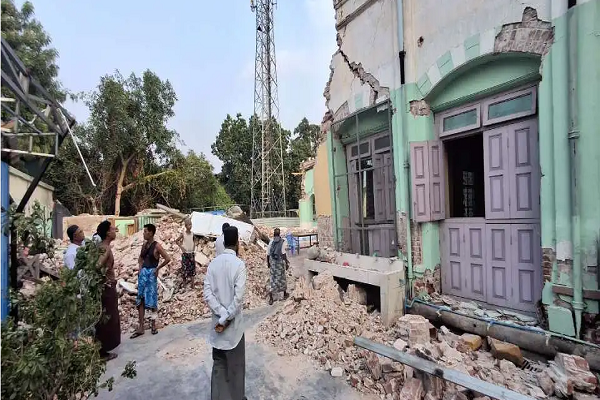Myanmar Junta Continues Discriminatory Policy against Muslims after Earthquake

Five months after a devastating earthquake hit Myanmar, Muslim leaders say the military junta in the Buddhist-majority country has intentionally withheld permission to rebuild the mosques destroyed by the temblor.
The March 28 earthquake with epicenter in Mandalay killed some 5,300 people and destroyed thousands of buildings, including mosques. However, several Muslim leaders say the junta seems to be following a discriminatory policy, allowing Buddhists to rebuild their temples while withholding permissions for mosques.
In Mandalay, Myanmar's second-largest city, 59 of its 65 mosques were severely damaged or collapsed in the earthquake, according to U Ko Latt, 44, a member of the trust that operates the city’s Kyauk Masjid mosque.
He said that 33 of the 59 severely damaged mosques have received approval for demolition from the junta's Ministry of Religious Affairs and Culture. The remaining 26 mosques that applied are still awaiting approval for the demolition of damaged buildings.
Those waiting for demolition permission include the Kyauk Masjid, built in 1858. It suffered extensive damage, and the engineering team from the Mandalay City Development Committee classified it as a "red-level building," indicating that it requires demolition and rebuilding.
Ko Latt said that obtaining permits for even routine maintenance, such as replacing a roof sheet, has been “very difficult” for several decades due to the “discriminatory policies” of successive regimes.
"The lack of repairs made mosques more vulnerable when the earthquake hit," said.
Read More:
The junta spokesperson in Mandalay Region, U Thein Htay, refused to comment when UCA News contacted him.
‘Worship in make-shift tents’
Most Muslims in Mandalay and Sagaing still worship in temporary tents on the grounds of the damaged mosques, some of which are dangerously damaged. Still, the government hasn't allowed them to be taken down.
Sagaing Township, the epicenter of the earthquake, has six mosques. Three of them collapsed, killing some 170 people as the quake hit during the Friday prayers, leaders said.
All three collapsed mosques received demolition permits, but they did not get approval to rebuild, according to Kyaw Lin Aung, the Mawlawi (religious teacher) of the Moekya mosque — one of the three that collapsed.
He said the “worshippers now use makeshift tents for prayers. On sunny days and during the heat wave, it becomes unbearable. It was so hot that we couldn't properly perform our worship.”
U Ahr Min, 73, the imam of the Shwe Phone Shein mosque in Mandaly, told UCA News that he escaped miraculously when the mosque building collapsed, killing some 20 people. He also lost his family, who lived in the mosque complex — his wife, two daughters, and two sons.
However, Min continues to lead prayers on a makeshift tent near the damaged mosque as the cracked walls stand precariously, making the building dangerous for worship.
"We have already suffered great losses," said Ahr Min. "In this situation, our only hope is to be able to rebuild our mosque as quickly as possible and to be able to worship with dignity."
“Not even grounds allowed’
In at least one instance, the junta police prevented worshippers from even entering the grounds.
Gad Tan mosque in Sagaing Township has been sealed off by the police, said Haji U Myint Than, the leader of the Islamic religious affairs committee in Sagaing Township.
The mosque on the banks of the Ayeyarwady River was built in 1902 on a piece of land donated by Rahim Baksh, a police officer of British India at the time. The mosque stands close to the town police station, and in 2020, the police station claimed that the mosque's land was part of its own.
Read More:
Before the dispute could be resolved, the junta took power through a military coup in February 2021, and the case saw no further progress, according to its imam, U Maung Maung Soe.
The Imam and his family lived inside the mosque complex. However, on May 27, four policemen barged in and “ordered us to leave immediately," said his wife, Daw Cho Cho Win.
"We weren’t even able to say our evening prayers. We are very sad because this is one of the homes of Allah, and it has been closed," she told UCA News.
UCA News attempted to contact U Nyunt Wing Aung, a spokesperson for the junta in the Sagaing Region. However, he declined to comment.
The local police officer, who sought anonymity as he was not permitted to speak to the media, stated that the dispute remains unsettled. The local police blocked the mosque entrance but said that it should “not be considered as an official sealing of the mosque.”
Myint Than from the Islamic religious affairs committee in Sagaing said, besides these challenges, Muslims also undergo personal difficulties as their homes have also collapsed.
Lack of mosques adds to the “emotional distress. Our friends and relatives died, and we feel deep sorrow. We just want our mosques back as a relief. We want to worship as we did before,” he said.
Source: ucanews.com



